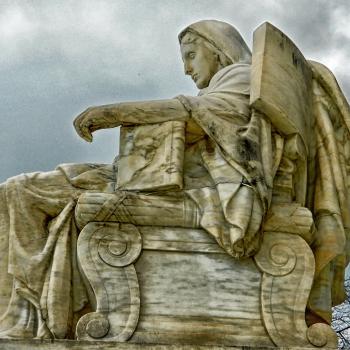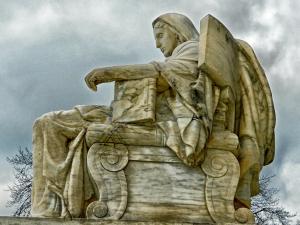
The bloodthirsty nature of many of those who call themselves pro-life reveals itself every time they defend the death penalty. They prove that they do not care about the dignity of life and its preservation. Their bloodlust does not allow them to think life is of inalienable value. Instead, they believe some have lost their right to life and should be put to death. It doesn’t matter if someone is innocent, if the supposed victims of an accused criminal plea for mercy, they want the right to kill, and they use the supposed justice system as the means to satisfy their lust for death. How else can one explain the lack of empathy when it is pointed out that many whose lives are snuffed out are later proven innocent? Scalia made it clear, the issue wasn’t about innocence, but following the letter of the law, proving Paul correct in saying it is the letter which kills (cf. 2 Cor. 3:6).
For this reason, it is not surprising that those who desire blood will do whatever it takes to satisfy their desire. If and when those who made the drugs used to execute people decide not to make them anymore, instead of seeing this as a sign that society as a whole does not want to promote death, those who promote capital punishment decide it is time to go back to more barbaric and cruel ways of execution, such as the use of the electric chair or firing squad. Thus, we see states making it clear, they will kill, and if need be, they will make the situation worse by having their victims choose how they should be executed. This is exactly what happened in South Carolina, where the governor signed into law guidelines which make sure no one would get in the way of the state’s bloodlust:
If execution by lethal injection under this section is determined and certified pursuant to subsection (B) to be unavailable by the Director of the Department of Corrections or is held to be unconstitutional by an appellate court of competent jurisdiction, then the manner of inflicting a death sentence must be by electrocution, unless the convicted person elects death by firing squad.[1]
While the revival of previous forms of execution are in themselves an indication of how mad our society has become, what is worse is that those who should know better, Christians, are among those promoting such actions. God is the God of life. Those who fight against life, those who cheapen life and think it is something easily taken away, take their stand against God. For God has made it clear that no one should repay evil with evil, death with death:
Repay no one evil for evil, but take thought for what is noble in the sight of all. If possible, so far as it depends upon you, live peaceably with all. Beloved, never avenge yourselves, but leave it to the wrath of God; for it is written, “Vengeance is mine, I will repay, says the Lord.” (Rom. 12:17-19 RSV).
We are told that we should be kind, not cruel, for when we are cruel, we will hurt ourselves. “A man who is kind benefits himself, but a cruel man hurts himself” (Prov. 11:17 RSV). This is true, not only on a personal level, but for society as a whole. When society is cruel, it will also hurt itself. For it will be promoting cruelty as a good, and in doing so, will perpetuate cruelty. The death penalty does not save the world from cruelty, it does not protect the world from violence, but rather, it perpetuates violence as it promotes and establishes violence as a good. Christians should know that the solution, the way out of the cycle of death and violence, is the promotion of restorative justice and mercy. This, after all, is the message of the Gospel: God became one of us to save us, not to condemn and destroy us for our sins. It is only a Satanic hate which would promote annihilation as the solution to sin.
Pope Francis preached that “every act of violence committed against a human being is a wound in humanity’s flesh; every violent death diminishes us as people.”[2] Every time society engages violence, every time it attacks and kills someone when there are other, better options, society violates the dictates of justice and so wounds itself by promoting injustice over justice, especially if it calls such injustice, justice. How can society be stable when it cuts itself away from justice? It should be no surprise that those who embrace injustice become people of the lie, using all kinds of lies to justify further injustice, and when that does not work, they will use brute force to keep themselves in power. No society established or preserved by such means can last.
Society must reorient itself. It must promote life, helping those in need, helping the poor and the oppressed. It must recognize every life is of value, and no life should be needlessly snuffed out. Central to this reorientation is the rejection of the death penalty:
The firm rejection of the death penalty shows to what extent it is possible to recognize the inalienable dignity of every human being and to accept that he or she has a place in this universe. If I do not deny that dignity to the worst of criminals, I will not deny it to anyone. I will give everyone the possibility of sharing this planet with me, despite all our differences. [3]
So long as the death penalty is accepted, the value of life will be denied; but when it is rejected, then we begin to see society recognizing the value of all life, that no one is viewed as undeserving of basic rights. When life is truly appreciated, then things will change. The poor will not be mistreated for being poor; migrants and refugees will not be denied their rights; systematic structures of sin, such as those which underlie racism, will be taken down.
Christ has shown Christians the way. Sinners need to be healed. Justice needs to be restorative, not retributive. Punishment should work for the good of all, including, and especially, the good of the criminals. This is why Pope Benedict XVI told us prison reform is important: “Moreover, it is important to promote a development of the prison system which, as well as respecting justice, is increasingly adapted to the needs of the human person also by recourse to punishments alternative to imprisonment or to different forms of detention.”[4] Forgiveness must be possible; just as we like to be forgiven for what we have done, and the opportunity to change for the better, criminals must likewise be given that opportunity as well. It can even be given to those who do not yet ask for it because of their hardened heart: “If forgiveness is gratuitous, then it can be shown even to someone who resists repentance and is unable to beg pardon.”[5] This does not mean we will forget what has been done, because we will not; that is why we will work for restorative justice, for in restoring the good which someone lost due to their sin, instead of snuffing out what good remains in them, we know they have done wrong and that something must be done to counter that wrong. But it also means we do not forget the good which remains, the good which serves as the foundation by which such restoration can be had, the good which is forgotten by those who know no mercy or worse, who are bloodthirsty and desire death.
“Refrain from anger, and forsake wrath! Fret not yourself; it tends only to evil” (Ps. 37:8 RSV). We must as a society no longer accept vengeance and the anger which demands vengeance as the foundation for justice. We must forsake bloodlust and the wrath which it promotes. We must recognize the evil of such actions. We must no longer call such evil, good. We must recognize that those who follow through with their bloodlust, whether they are in positions of power and authority, or a part of the underclass, follows through with the same evil. The solution to that evil is not the promotion of further evil, but the greater good. Justice demands satisfaction, yes, but the satisfaction must be restorative, or else, all that will be established is further injustice as more and more people believe the lie that bloodlust is good and society as a whole will crumble away in its promotion of death.
[1] South Caroline General Assembly, Bill 200 (124th General Assembly, 2021-2022).
[2] Pope Francis, Address of Pope Francis at the Reconciliation Liturgy (9-8-2017).
[3] Pope Francis, Fratelli tutti. Vatican translation. ¶269.
[4] Pope Benedict XVI, Pastoral Visit to Rebibbia District Prison (12-18-2011).
[5] Pope Francis, Fratelli tutti. Vatican translation. ¶250.
Stay in touch! Like A Little Bit of Nothing on Facebook.
If you liked what you read, please consider sharing it with your friends and family!

























